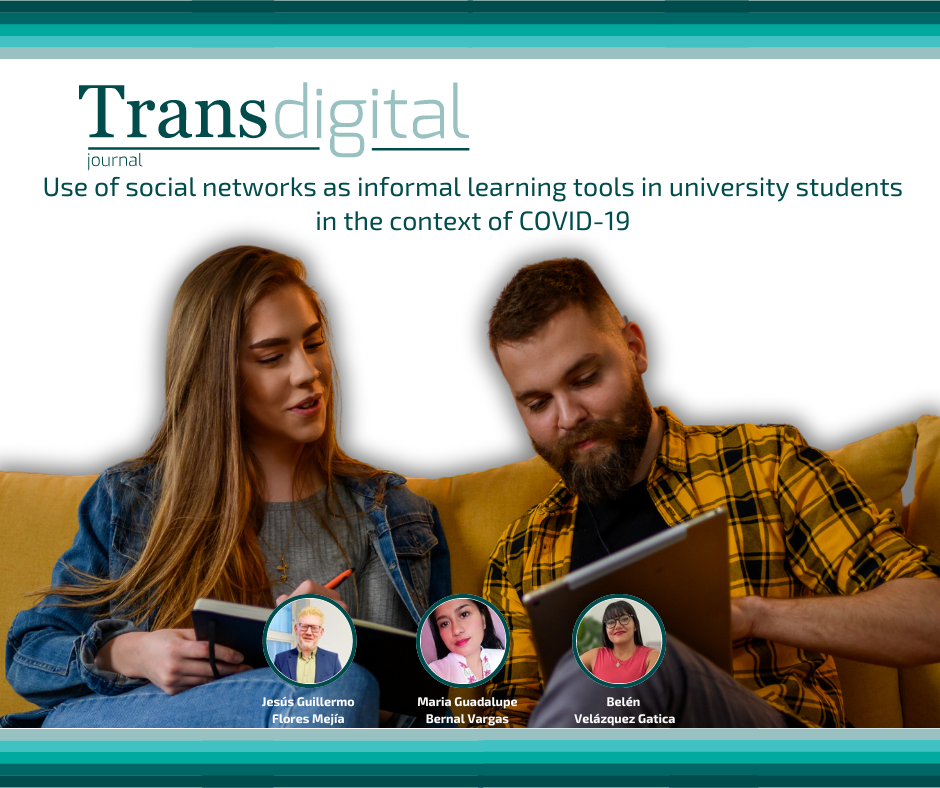Use of social networks as informal learning tools in university students in the context of COVID-19
DOI:
https://doi.org/10.56162/transdigital334Keywords:
virtual social networks, informal learning, university students, virtual modality, face-to-face modality, pandemicAbstract
This research identified the use of social networks for informal learning before and during the COVID-19 pandemic, in university students. The quantitative approach was used with a descriptive scope and a non-experimental, cross-sectional design. A questionnaire was designed to measure the variable of interest, through Google forms that was shared with the teachers to distribute to the 106 students participating in the study. The results indicated that the use of social networks increased during the pandemic for the acquisition of informal learning. In addition, it was identified that YouTube, Facebook, and WhatsApp were the social networks most used by university students. On the other hand, during the pandemic, 18% of students dedicated more than three hours to informal learning. It can be interpreted that the use of social networks increased during the pandemic because students needed new figures that would allow them to learn and understand topics of interest to them to compensate for the absence of teachers.
References
Alves, C., & Ferreira, C. (2016). Las redes sociales y el aprendizaje informal de Estudiantes de Educación Superior. Acción Pedagógica, 25(1), 6–20.
Asociación de Internet. (2021). 17° Estudio sobre los Hábtos de los Usuarios de Internet en México 2021. Página web oficial de la Asociación de Internet MX. https://www.asociaciondeinternet.mx/estudios/habitos-de-internet
Cabero, J., & Llorente, M. del C. (2015). Tecnologías de la Información y la Comunicación (TIC): escenarios formativos y teorías del aprendizaje. Revista Lasallista de Investigación, 12(2), 186–193.
Casero Béjar, M. de la O., & Sánchez Vera, M. del M. (2022). Cambio de modalidad presencial a virtual durante el confinamiento por Covid-19: percepciones del alumnado universitario. RIED-Revista Iberoamericana de Educación a Distancia, 25(1), 243–260. https://doi.org/10.5944/ried.25.1.30623
Erjavec, K. (2013). Informal Learning through Facebook among Slovenian Pupils. Comunicar, 21(41), 117–126. https://www.revistacomunicar.com/ojs/index.php/comunicar/article/view/C41-2013-11
Escofet, A., García, I., & Gros, B. (2011). Las nuevas culturas de aprendizaje y su incidencia en La educación superior. Revista Mexicana de Investigación Educativa, 16(51), 1177–1195.
García-Martínez, J. A. (2021). Herramientas asociadas al aprendizaje informal: oportunidades para potenciar los entornos personales de aprendizaje de estudiantes universitarios en tiempos de pandemia. Publicaciones, 51(3), 215–235. https://doi.org/10.30827/publicaciones.v51i3.18090
Hernández-Sampieri, R., Fernández-Collado, C., & Bautista-Lucio, M. del pilar. (2014). Metodología de la investigación. McGraw Hil.
Hernández, E. (2013). Influencia de redes sociales en hábitos de estudio de universitarios de primer año. Foro Educacional, 22, 131–148.
López, M., Herrera, M., & Apolo, D. (2021). Educación de calidad y pandemia: retos, experiencias y propuestas desde estudiantes en formación docente de Ecuadors. Texto Livre: Linguagm e Tecnologia, 14(2), e33991. https://doi.org/10.35699/1983-3652.2021.33991
Mejía, R. (2005). Tendencias actuales en la investigación del aprendizaje informal. Revista Electrónica de Educación Sinética, 26, 4–11. https://sinectica.iteso.mx/index.php/SINECTICA/article/view/247
Muñoz González, L. de la C., & Soto Gómez, E. (2020). Mahara como red social y portafolio digital en los nuevos contextos de formación inicial docente. Un estudio de caso. Revista de Educación a Distancia, 20(62). https://doi.org/10.6018/RED.397021
Ribeiro Pessoa, M. T., Hernández Serrano, M. J., & Muñoz Rodríguez, J. M. (2015). Aprendizaje informal, alfabetización mediática e inclusión social. Descripción de una experiencia. Profesorado, revista de currículum y formación del profesorado, 19(2), 75–91. https://revistaseug.ugr.es/index.php/profesorado/article/view/18757
Rosales, C. (2009). Aprendizaje formal e informal con medios. Pixel-Bit: Revista de Medios y Educación, 35, 21–32.
Torres-Diaz, J. C., Jara, I., & Valdiviezo, P. (2013). Integración de redes sociales y entornos virtuales de aprendizaje. Revista de Educación a Distancia, 35, 1–8. https://revistas.um.es/red/article/view/233651

Downloads
Autor de correspondencia
El autor de correspodencia se identifica con el siguiente símbolo: *Published
How to Cite
License
Copyright (c) 2024 Jesús Guillermo Flores Mejía, Maria Guadalupe Bernal Vargas, Belén Velázquez Gatica

This work is licensed under a Creative Commons Attribution 4.0 International License.
All articles in Transdigital are licensed under a Creative Commons Attribution 4.0 International License. Authors hold the copyright and retain publishing rights without restrictions.









